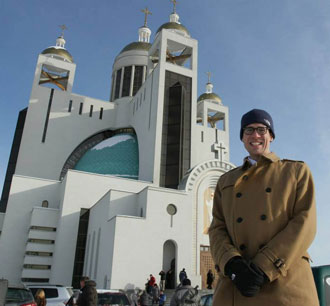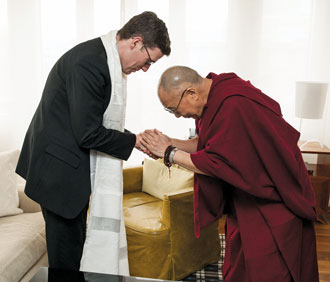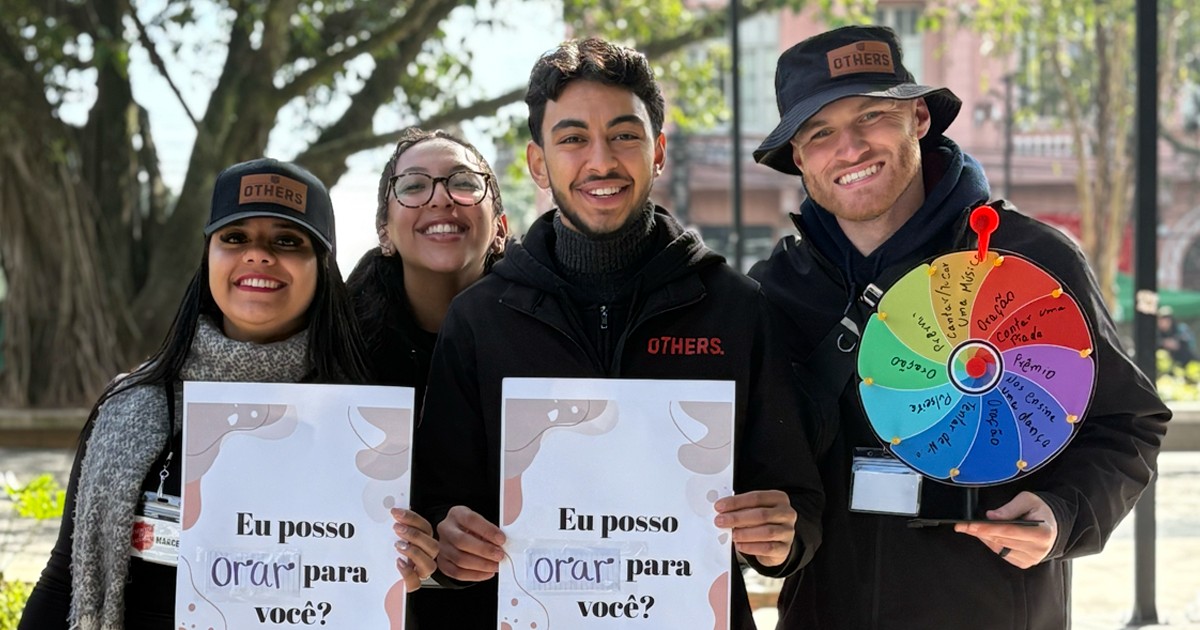Why is it important for Canada to have an Office of Religious Freedom (ORF)?
Over the last number of years, we've seen an increase of cases of religious persecution in many parts of the world. You see what's happening in the Middle East with ISIL [Islamic State of Iraq and the Levant] and their barbaric persecution of religious minorities, including Christians, Shiite Muslims and Sunni Muslims who refuse to accept their distorted view of Islam. We're also seeing sustained religious persecution in other parts of the world, such as Pakistan and China, where government restrictions on different religious communities are very harsh. There was a need to highlight the defence and promotion of religious freedom in the world within the government's broader human rights policy framework.
How does the ORF promote religious freedom in the world today?
There are three parts to our work: advocacy and outreach activities, policy development and programming activities. We don't have a domestic policy mandate, so our goal is not to defend religious freedom in Canada. But it's important that I reach out to different faith communities here to better understand the concerns they have about what is happening overseas. So this could be Tibetan Buddhists or South Asian Christians, or it could be communities such as The Salvation Army or the Catholic Church who have a long-established presence in a country, and various para-church organizations that can partner with us in advancing our mandate overseas.
I couldn't do this job if I didn't have a strong faith
I also meet with people in various countries where there are violations of religious freedom. Right now, we are focusing on 15 to 20 countries where significant violations are taking place. I engage with representatives of different faith communities and with government officials to call them to account for either their actions or inactions. And I meet with non-governmental organizations and human rights organizations to gain a better understanding of what is happening in those countries.
Our advocacy and outreach activities inform our policy work. We take in information from a variety of sources, including the people we reach out to, from our embassies and high commissions abroad, from academics. We take that information and come up with policies. Each country has a different set of issues so we have to have tailored policies for each situation. That policy development process then informs our programming activities through the Religious Freedom Fund.
What is the Religious Freedom Fund?
The ORF has a $5-million budget per year, and $4.25 million goes to the fund, which supports projects that address the root causes of religious persecution. We currently have 15 projects in different countries around the world—most are multi-year projects.
Can you give me some examples of projects supported by the fund?
We have a multi-year project in Indonesia where we're partnering with Setara Institute for Democracy and Peace to monitor religious freedom there, document specific cases of religious freedom violations and then report back on that, both to the Indonesian government and to our office. We're also trying to develop a capacity-building program for religious minorities and victims of religious freedom violations in the country.
 Ambassador Bennett stands in front of the Ukrainian Greek-Catholic Patriarchal Sobor (Cathedral) of the Resurrection of Christ in Kyiv, Ukraine
Ambassador Bennett stands in front of the Ukrainian Greek-Catholic Patriarchal Sobor (Cathedral) of the Resurrection of Christ in Kyiv, Ukraine
We have a project in Sri Lanka with a Canadian partner called the Equitas International Centre for Human Rights Education where we're dealing with a post-conflict situation. Sri Lanka has come out of a period of civil war, so there are sometimes challenges with the Sinhala nationalists who are strongly Buddhist and the Tamils who are Hindus. There are also small Christian and Muslim minority groups. Equitas is working to have a number of different educational modules and a variety of activities that will try to foster discussion about respect for difference.
And in Ukraine we're working with the Organization for Security and Co-operation in Europe on a project that promotes security for religious communities there. A lot of the work they'll be doing will be training law enforcement agencies in how to address hate crimes.
What is your religious background and how does that affect the way you do your job as ambassador?
I think regardless of who the government chooses to take this position as Ambassador for Religious Freedom—whether they are Jewish, Muslim, Christian or atheist—they're always going to bring their own perspective to the role. I'm Ukrainian Greek Catholic, and I wear my faith on my sleeve—I'm a devout Christian and I couldn't do this job if I didn't have a strong faith.
Why do you say that?
Because it's part of who I am—I can't separate my work from my faith. My faith informs my work. For Christians, there is a strong emphasis on seeing the image and likeness of God in others, and I think that links intrinsically to the idea of human dignity. When we defend religious freedom, it's a defence of the dignity of every human being. So being a Christian and having that incarnational understanding helps me reach out to people from all faith backgrounds. Fundamentally, I'm not defending a theological position; I'm defending human beings.
Where is freedom of religion most suppressed today?
There are various ways in which religious freedom can be violated. There can be government restrictions on religious freedom, including the ability to worship in peace and security, the ability to engage in missionary activity if that's what your faith calls you to, the freedom to not have any religious belief and the freedom to change religion. Some of the most egregious examples of countries where there are significant government restrictions on religious freedom would be China, Saudi Arabia and Iran.
When we defend religious freedom, it's a defence of the dignity of every human being
Then there are countries where there are no government restrictions on religious freedom, but there are significant social hostilities between one group and another. In Nigeria, for example, you have sectarian divisions between Christians and Muslims, which each represent 50 percent of the country's population. There's also Boko Haram [an Islamist group], which goes beyond violations of religious freedom and into violent extremism and terrorism.
In a country such as Pakistan, there are both significant restrictions on certain religious communities and social hostilities, whether they're Hindus, Muslims or Christians—there's a whole range of groups that face a societal persecution in Pakistan.
Tell me about some of the successes the ORF has had since its inception.
 Ambassador Bennett meets with His Holiness the Dalai Lama
Ambassador Bennett meets with His Holiness the Dalai Lama
One of our great successes is a program in Nigeria where we've partnered with a Geneva-based organization called the Centre for Humanitarian Dialogue. This project is in the Middle Belt of the country where Christians and Muslims meet, in and around the city of Jos. There is a significant history of sectarian violence in Jos, and even recently there have been bombings there—perpetrated, we expect, by Boko Haram. This project has built networks between the Christian and Muslim communities so they could get to know each other, communicate and recognize that violence hurts both communities. The dialogues that were launched by the Centre for Humanitarian Dialogue have had tremendous success. Whenever there has been a bombing in Jos or an increase in tensions, these networks spring into action, contact each other quickly and reduce the tension. In the last two cases of bombs exploding in Jos, there has been no upsurge in sectarian violence and this project has played a large part in that. Now there are other parts of the country that are looking to this model to help manage their own challenges when it comes to sectarian issues.
As an ambassador, do you ever feel the limits of diplomacy? I'm thinking, for example, of the 220 Assyrian Christians who were recently abducted in Syria. Your office can issue a statement and we can pray for their release, but there are limits on what we can do. How do you deal with that?
I think the realities of religious persecution in the world need to be acknowledged and that we can't always take the measures that we need to take to free these people. Right now I'm looking at a Coptic icon of the 21 martyrs of Libya [beheaded earlier this year], and I've got on my computer monitor in front of me a picture of Metropolitan Paul of Aleppo and Bishop Gregorios Ibrahim of Aleppo, who were kidnapped in Syria almost two years ago. I see these two images every day when I come in to work.
Why do you keep them on your computer monitor?
To remind me of why I need to do what I'm doing. There are people facing persecution who sometimes go forgotten. I can only imagine the pain and suffering that these bishops are undergoing—the pain and suffering of being held captive, but also the pain of being away from their flocks.
So there are limits to diplomacy, absolutely, but if we don't use diplomacy—if we don't use all of the tools we have at our disposal—then we are doing an insufficient job in trying to target religious persecution. We're not going to change the situation in these countries overnight. In some of these countries, it could take generations to bring about stronger institutions, greater respect for the rule of law, greater freedoms. It's going to be a long process, but we have to start somewhere. We have a responsibility to defend others who face persecution, and we have to have faith that we can make a difference, so there must be perseverance.










Comment
On Friday, June 26, 2015, cassie kean said:
On Tuesday, June 16, 2015, Alonzo Twyne said:
On Monday, June 15, 2015, Christina said:
On Saturday, June 13, 2015, Alonzo Twyne said:
Leave a Comment